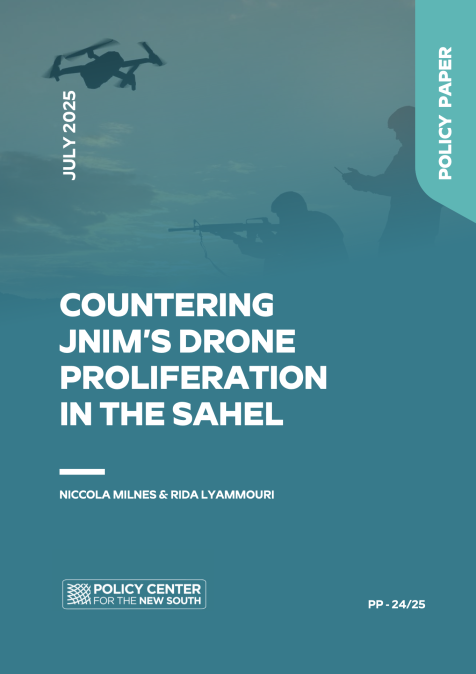John Sawers, former Chief of the Secret Intelligence Service (MI6), shares his insights on how security threats have evolved with the rise of digital technologies and social media. In this interview, he offers a compelling exploration of the shift from traditional methods to contemporary security challenges. Sawers examines how intelligence approaches have adapted to address new threats, including the influence of social media on democratic processes and the evolving global geopolitical landscape. The discussion provides An insightful analysis of the current dynamics in intelligence work and highlights the critical issues facing intelligence services in an increasingly interconnected and digital world.
RELATED CONTENT
-
Chaima Jabbar and Dahan Ahmed MahmoudJuly 18, 2025Dans cet épisode du podcast APSACO, Monsieur Dahane Ahmed Mahmoud, Directeur de l’Institut Mauritanien d’Études Stratégiques, aborde les défis sécuritaires auxquels fait face le pays ains ...
-
July 17, 2025In this episode, we explore Illegal, Unreported, and Unregulated (IUU) fishing in Atlantic Africa, a crisis that drains marine resources, harms coastal livelihoods, and threatens regional security. Luis Miguel Escudeiro da Costa Cabral from the Atlantic Centre joins us, sharing how his ...
-
AuthorsNiccola MilnesJuly 14, 2025Jama’at Nusrat al-Islam wal Muslimin (JNIM), alongside the Front de Libération de l’Azawad (FLA), has pioneered drone warfare in the Sahel–evolving from its first armed strike in September 2023 to over a dozen coordinated operations by June 2025. JNIM’s drone-enabled attacks–spanning kamikaze strikes, ISR- guided assaults, and visual propaganda–now target Mali, Burkina Faso, and Togo. It is the only known armed group in Africa–and one of the few globally–to conduct sustained, opera ...
-
Oumaïma El Azami El Hassani & Zineb BenallaJuly 11, 2025In this episode, we speak to Zineb Benalla, international consultant and CEO of Eirene Associate, as she reveals the vital yet often hidden roles youth and women play in peacebuilding, sh ...
-
July 4, 2025Tensions are rising in the Strait of Hormuz, a crucial oil route, as Iran clashes with its rivals, fueling fears that conflict could spill into vital shipping lanes. Missile attacks and military threats risk disrupting global energy supplies and sending prices soaring, with consequences...
-
Sofia Formigli & Stephen KlingebielJuly 04, 2025This episode explores how poverty, inequality, and climate change fuel insecurity and instability, often pushing fragile states toward militarization at the cost of social welfare. It exa ...
-
 AuthorsKhadija MamouniJuly 3, 2025While global attention has been focused on the Houthi rebel attacks in the Red Sea, Somali pirates have seized the opportunity to escalate their own attacks and violence along these strategic waterways. The threat is increasing dramatically due to an emerging network of allies between Al-Shabaab, the Houthis, and Somali pirates, as well as overlapping national and international factors. The first successful Somali piracy incident since 2017 took place in December 2023, a month ...
AuthorsKhadija MamouniJuly 3, 2025While global attention has been focused on the Houthi rebel attacks in the Red Sea, Somali pirates have seized the opportunity to escalate their own attacks and violence along these strategic waterways. The threat is increasing dramatically due to an emerging network of allies between Al-Shabaab, the Houthis, and Somali pirates, as well as overlapping national and international factors. The first successful Somali piracy incident since 2017 took place in December 2023, a month ... -
July 1, 2025في هذه الحلقة من برنامج "حديث الثلاثاء"، نناقش التحولات الدولية المتسارعة تجاه قضية الصحراء المغربية. نركز على اتساع الدعم الدولي لمبادرة الحكم الذاتي وتراجع الاعتراف بـ"الجمهورية الصحراوية المزعومة". كما نستعرض دور الدول الإفريقية والعربية في الدفع نحو حل نهائي وسط انقسامات مجلس الأمن....
-
June 20, 2025As the African continent grapples with a new generation of complex and interconnected threats, ranging from violent extremism and transnational crime to governance-related tensions and climate-induced insecurity, Southern Africa is also called upon to reinforce its contribution to conti...
-
June 20, 2025The return of Donald Trump to the U.S. presidency has added a new layer of uncertainty to an already volatile international landscape. Early policy signals suggest renewed emphasis on transactional diplomacy, reduced multilateral engagement, and a reshaping of traditional alliances, all...




